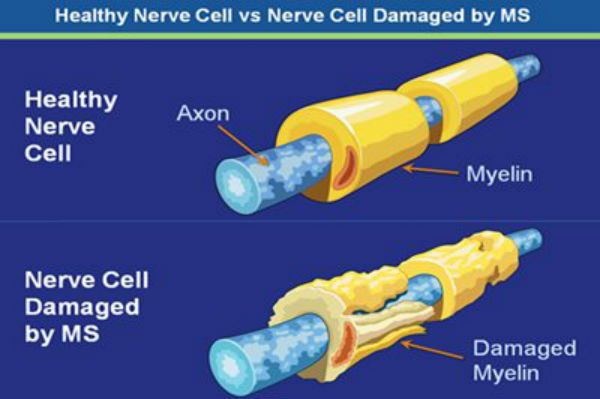If you know someone who lives with multiple sclerosis, you know how difficult even simple, everyday tasks can be with this disease.
If you don't know someone with MS, consider yourself lucky.
The National MS society reports that one million Americans are living with MS, while 200 new cases are diagnosed every week.
That's why it's so important to recognizing the early warning signs of MS. With no "cure" for this disease, spotting the symptoms early on is crucial.
What is MS?
Multiple sclerosis is a neurological illness that affects the brain and spinal cord.
Nerves in these parts of your body help control movement. They send signals from your brain other body parts, like your limbs, telling them to move.
The nerve cells are wrapped in a protective coating called myelin, which is damaged by MS.
The more damage the myelin suffers, the more the signals sent by your brain are scrambled or interrupted, causing symptoms throughout your body.
MS can even damage the nerve cells themselves, causing lasting and serious damage to your body.
Along with movement, MS can interfere with a patient's vision and sense of touch.
It's a progressive disease, which means the longer you have it the more severe your symptoms become.
But patients usually experience periods of improvement (called remissions) in between periods where there symptoms flare up (called relapses).
What are the symptoms of MS?
Every patient's experience with MS is different.
While these early warning signs of the disease are common, most people experience just a few of them:
- Fatigue
- Pain
- Trouble swallowing
- Numbness or weakness in your limbs (usually on one side of your body)
- Loss of vision (usually in one eye at a time)
- Pain when moving your eye
- Double vision
- "Electric-shock" sensations when you move your neck (normally after bending forwards)
- Tremors, clumsiness, lack of coordination
- Slurred speech
- Dizziness
- Problems with your bladder or bowels
- Mental changes (including memory trouble and mood swings)
- Psychological conditions such as depression
- Epilepsy
If you experience any of these symptoms and can't explain them, visit your doctor. MS symptoms are infamously vague, so you should never rely on your own diagnosis.
MS does not always develop the same way. It can change in small "steps" over several years, or linger as one symptom before suddenly getting worse.
What are risk factors for MS?
Researchers are learning more about MS every day, but the process that causes the disease is still a bit of a mystery.
MS is considered an autoimmune disease: for some reason, the body attacks its own myelin linings, but it's not clear why.
What we know for sure is that people between age 40 and age 60 are most likely to develop MS. Women are also twice as likely as men to develop MS.
Having a condition like thyroid disease, inflammatory bowel disease, or type 1 diabetes also raises your risk of developing MS.
Certain conditions can also cause MS conditions to flare up, including fevers and stress.
For the most part, your genetics (and certain environmental factors) seem to be the main causes of MS.
Because of this, studying your family history will reveal how concerned you should be about MS.
What is the treatment for MS?
There is no "cure" for MS, but there are treatments and medicines that help patients recover from relapses and manage their symptoms.
First, a doctor will have to diagnose that you actually have MS - misdiagnoses of this condition are very common.
This usually involved a physical exam, a brain scan like an MRI, or a study of your spinal fluid collected through a lumbar puncture.
Different prescription medications, therapies, and lifestyle changes are used to manage the symptoms of MS, depending on how quickly the disease progresses.
Now that you know the risk factors and warning signs of MS, don't ignore them!
[H/T: Mayo Clinic, MS Society.org, NHS, MS Society.ca,


